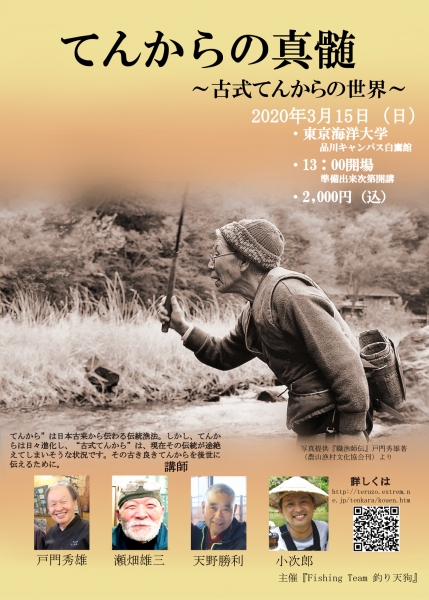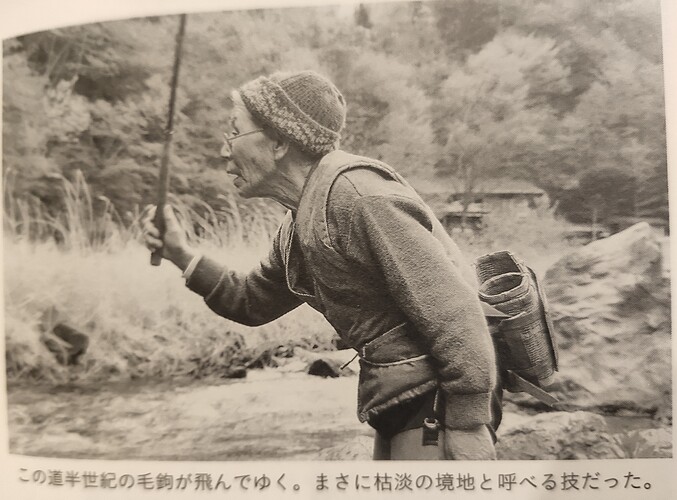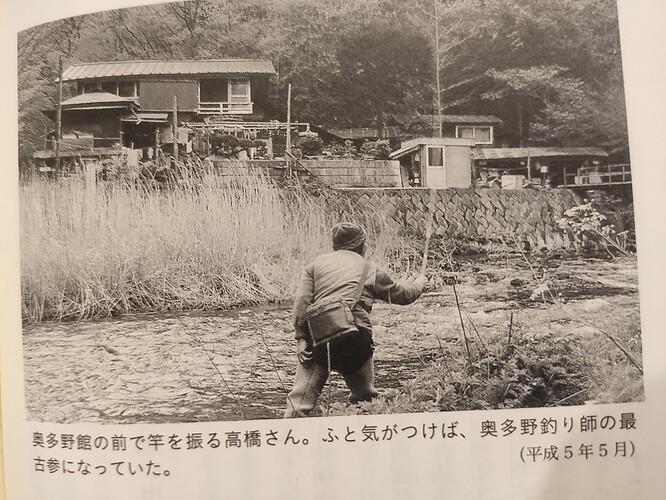Preserving ~ The essence of old-fashioned Tenkara World ~

Anyone know who the tenkara angler is in the larger picture on the cover?
Actually he might be identified / named in the text below the picture, but I haven’t yet figured it all out.
When I first saw the above image I thought it was a book or magazine cover.
But it is a poster for an event originally schedule to be held this past March 15th. But postponed due to corona-virus.
The notice of postponement hoped it could be done in November. However, a date certain has not yet been set.
Lectures to be given by the 4 people pictured at the bottom. Who know the the old ways of tenkara as a foundation to the rapidly changing ways of tenkara as it has expanded in popularity and spread round the world.
Of course the event will be done in the Japanese language, but if or when the event can be held - hopefully blog post about the event will be more accessible to English or other language speakers. I think there may be some interesting perspectives.
As you can see they used different Japanese characters for the title than the more common characters we see.
Which I suspect was in keeping with the theme. Using the Japanese characters for traditional Japanese words, and not the characters usually used for words borrowed from other languages.
てんからの真髄 〜古式てんからの世界〜
is the same as
テンカラの真髄 〜古式テンカラの世界〜 (which google more reliably translates)
[Tenkara no shinzui 〜 koshiki Tenkara no sekai 〜]
The essence of tenkara ~ The world of old-fashioned Tenkara ~
The four speakers:
講師紹介 (講演順)Lecturer introduction (in order of lecture)
戸門秀雄さん Tokado Hideo-san
瀬畑雄三さん Sebata Yūzō-san
天野勝利さん Amano Katsutoshi-san
小次郎さん Kojirō-san
I didn’t readily recall Kojirō-san. But an internet search quickly found his blog, which I recognized I have looked at it many times over previous years.
Being the youngest of the four lectures he faces that duty to preserve the older tenkara traditions and methods with great humor at being selected for the honor, and humility.
小次郎さんのブログ Kojirō-san’s blog - てんからとヤマメ - tenkara and yamame:
http://tenkaratoyama.jugem.jp/
Anyway, links to the two original and digitally translated webpages promoting the event.
てんからの真髄〜古式てんからの世界〜
http://teruzo.extrem.ne.jp/tenkara/kouen.htm
http://teruzo.extrem.ne.jp/tenkara/ The essence of tenkara ~ The world of old-fashioned Tenkara ~
講師紹介 (講演順) Lecturer introduction (in order of lecture)
http://teruzo.extrem.ne.jp/tenkara/kousi_syoukai/kousi.htm
http://teruzo.extrem.ne.jp/tenkara/Lecturer introduction
Lastly – Kojirō-san’s January invitation for - Everyone to look at this -
His take on the event, and his invitation to be one of the lecturers. ![]()
http://tenkaratoyama.jugem.jp/ Everyone look at this ~ ~
Maybe some will find this interesting.

